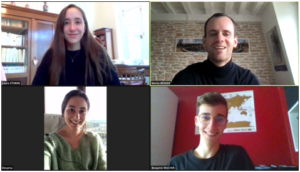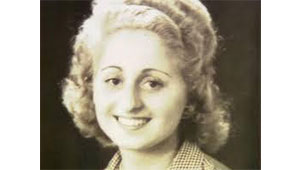| → Could you tell us more about how you include the Convoi 77 project in your courses and about the sources that you use?
The project starts in September for the pupils; however, we start to prepare it from May so that the main information, the available archives and the documents that we want to offer to the pupils are ready at the beginning of the school year. Then, each year, a weekly hour integrated into the students’ timetable is dedicated to the activities carried out within the framework of the Convoi 77 project and mainly concerns the work of historical investigation, biographical writing, artistic production and video production.
From a practical point of view, we first use the archives that are made available to us by the Convoi 77 association and which come from the Division of Archives of Victims of Contemporary Conflicts, a very good data basis which allows us to get very important information right away for the rest of the project. Then, depending on the history and background of each deportee on whom the students work, we cooperate with specialized institutions (the Shoah Memorial, the Bad Arolsen-ITS archives, the municipal archives and/ or departmental in particular) also seeking to establish contacts with members of the family of the deportee(s).
→ Have you had the chance to meet and discuss with other family members of the deportees? What emotions did this create for you and the students?
Yes, we had the chance to exchange writings with Marie, the sister of Bernard Goldstein (see biography) whose biography my students wrote in 2017-2018. We managed to establish contact with her through her daughter which was not easy as they both live in the United States!
I have also had the chance to meet Mina Bender, Jacques (see biography), Dora (see biography) and Jean`s (see biography) sister several times, whose story my students told in 2018-2019. These moments of discussion were very strong on a human level and we wanted to keep her regularly informed of the progress of the project. My students were unfortunately not able to meet her because she lives at the other end of France but we recorded a video in which some students volunteered to introduce themselves and explained to her the nature of their work, while specifying what the project had offered them. We sent the video to Mina who was very touched. In return, she agreed that we make a video in her home in which she sent a message to the students. They were very proud and moved to have been able to establish contact with her.
→ What kind of difficulties – if any – do you usually encounter?
Carrying out such a project involves an intrinsic difficulty, linked to the level of commitment required. However, over the past four years the students have not faced any major difficulties that would have prevented the project from being completed. On the contrary, we were able to observe, faced with the difficulties, that the pupils most at ease in writing and/ or speaking spontaneously came to the aid of pupils who might find themselves in difficulty during the historical research and the biographical writing.
Finally, due to the loss of certain archives and witnesses, the students are necessarily confronted with the difficulty of telling the life of the deportees without necessarily having all the information that they might need. Here again, they were able to overcome these difficulties by imagining new ways of storytelling and sometimes using their imagination. This was, for example, the case in 2018-2019 when the students invented dialogues between Jacques, Dora and Jean Bender, three children deported together on July 31, 1944 (see dialogue). On the fringes of the scientific approach undertaken, these dialogues have enriched the historical narrative by giving it a sensitivity that seems relevant to us.
→ What type of reactions / interactions has your work received so far?
The Convoi 77 project has, over time, been perfectly integrated into the college’s establishment plan and at the end of each school year, we have more and more 4th year students who express their willingness to integrate the 3rd year project class. For us, this is a sign that the project has a meaning for the students. On the other hand, as I indicated above, we attach great importance to keeping the families of deportees regularly informed about the progress of our work. We then discuss the products made by the students and it is always very enriching. Our project has also been twice a winner of the Ilan Halimi Prize awarded by the Departmental Council of Essonne in 2018 and 2019. It is for all of us, teachers and students, an immense recognition and great pride!
Finally, the newspaper Libération mentioned our work in an article published on January 23, 2019, on the occasion of the great restitution meeting organized at the Hôtel de Ville in Paris by the association Convoi 77 and during which my students presented their work (see article). More recently, Le Monde published an article that I wrote on the project on the occasion of the commemorations of January 27, 2021 (see article) and the Seligmann Foundation published an article devoted to our work in the section “Example to be followed” from its newspaper Après-demain (June 2021) (see article).
→ In your experience, how does Convoi 77 help students understand the history of the Holocaust? And how do the pupils themselves usually perceive it (in terms of emotions, acquired knowledge, etc.)?
After four years of involvement in this project, I was able to measure the extent of the educational, civic and memorial contributions of the process and in particular of the individual approach in the study of the Shoah. My way of teaching about the Shoah has been totally transformed, in particular through the microhistorical approach which, in my opinion, draws the attention of students to the pitfall which would consist in reducing each deportee to his status of the victim. In addition, the project, by taking place over the entire school year, seems to me to be very beneficial, both in terms of acquiring knowledge and in terms of citizen reflection.
In addition, allowing students to use their pen to write a page of history on their own was also a great way to strengthen their knowledge, their methodological tools and their autonomy. They have also, undoubtedly, gained confidence and no longer hesitate, at the end of the school year, to speak up to explain the nature of the project and their productions.
→ After many years of working on the project, what motivates you the most?
The students are my motive! What motivates me the most is to see their level of commitment to the project, their attachment to the process and to the work that we are offering them to do during the year. It is always very strong to witness the emotion and pride they show when they are asked to present the project and their productions.
The educational, civic and memorial contributions observed over the past four years are also an immense source of motivation because they demonstrate that this project is not only useful but also absolutely necessary.
Thank you to Clément Huguet and his students for their time and contribution.
Find all the biographies produced by the students by following these links:
→ https://convoi77.org/deporte_bio/jean-bender/
→ https://convoi77.org/deporte_bio/dora-bender/
→ https://convoi77.org/deporte_bio/jacques-bender/
→ https://convoi77.org/deporte_bio/bernard-goldstein/
–
The experience of the Convoi 77 Sciences Po team
After eight months of collective work, the Convoi 77 Sciences Po team for the 2020/2021 academic year is completing its activities, which will be continued by the next team in the fall. This unique project allowed four master’s students – Despina, Laure, Benjamin and Moritz – to meet and work together on the memory of the Shoah despite the fact that they are following different masters.
Bien que la pandémie ait compliqué certains aspects du travail de l’équipe comme la prise de contact avec des enseignants et élèves qui ne participent pas encore au projet de Convoi 77, l’équipe a pu établir de nouveaux contacts en Grèce, Roumanie, Autriche et Lettonie avec des établissements scolaires, des centres de l’Holocauste et des femmes politiques européennes. En plus, la virtualisation a rendu possible la participation aux réunions et webinaires à l’étranger comme celui du Ministère de l’Éducation autrichien en janvier 2021 ainsi que le travail collectif à travers trois pays de l’UE.
Although the pandemic complicated some aspects of the team’s work, such as making contact with teachers and students who are not yet participating in the project Convoi 77, the team was able to establish new contacts in Greece, Romania, Austria, and Latvia with schools, Holocaust centers and European women politicians. In addition, virtualization has made it possible to participate in overseas meetings and webinars such as that of the Austrian Ministry of Education in January 2021, as well as to collectively work across three EU countries.
The Convoi 77 Sciences Po team is very happy to have been able to contribute to the work of the European project Convoi 77 project and wishes its successors success and joy.

The Sciences Po team Oct. 2020 – June 2021
–
Help and advice on the Convoi 77 platform
http://www.edu.convoi77.org
1. EDU is a platform for YOU and your classes to better manage your project: this is where the Convoi 77 team shares with you the documents they possess concerning the deportees you are working on!
2. To access the documents made available to you, select “Edit my biography” to search for the name of the deportee in question in the search bar. Click on his/her name, then on “View deportee” at the top left.
3. To better understand how to use the platform, you can use the “tutorials” on the site.
4. Ask all your questions and share your ideas or thoughts with the other professors of the project as well as with the team on the “forum!”
5. In particular, you can organize visits to the Shoah Memorial or to other places of memory elsewhere in France by selecting “The stages of the Project” then “Visit a place of memory.”
6. Bookmark the edu.convoi77 site for easier access!
A question? Do not hesitate to contact the France and International team of Sciences Po at the following address: convoi77.equipesciencespo@gmail.com |
